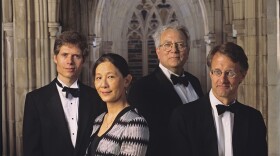Aaron Copland’s Appalachian Spring is arguably one of the most important American works on the 20th century, or at least one of the most well known. But during this weekend's performance at the North Carolina Symphony it will be followed by works from much younger composers.
One of those is by American composer, Sarah Kirkland Snider. She is part of a growing group of young American composers who are finding homes for their works alongside those old stalwarts. North Carolina Symphony music director Grant Llewellyn says it is an exciting time in American music. "I think that this younger generation, if you want, have absorbed all the the popular idioms of the day and they have made them their own and yet there's a sort of a critical mass of them now who come from a highly sophisticated background."

Sarah Kirkland Snider’s piece is part of a song cycle called 'Unremembered' and was inspired by the poetry of a friend and visual artist Nathaniel Bellows. The piece focuses on Bellow’s time growing up in rural Massachusetts says Snider, "It is a pretty dark work. I mean it is about innocence and ruin. It is about all the ways that the world feels when you are a child and you have these outsized emotions and everything is big and scary and beautiful and dark or light and amazing and revelatory and I wanted to capture that kind of astonished fraught sensation of being a child and feeling those feeling really intensely."
Which does make one wonder how it fits with a piece which is considered to be as hopeful as Copland’s Appalachian Spring. Grant Llewellyn says they fit perfectly and that there is a dark side of Appalachian Spring, "There are some really acerbic, dissonant harmonies where I feel the fear of these young pioneers. This young couple setting out into the unknown and it must have been terrifying at times."
While it may seem intimidating to hear your work played after a piece like Appalachian Spring, which is just so well known and where there are no surprises for the audience. "Well if I know composers, they are a pretty bold self-confident bunch," says Llewellyn. "They want their music out there to be heard and there are very few I know who are, who would be intimidated by having their music alongside anybody else. And after all even Aaron Copland was young once."
The North Carolina Symphony has more .










